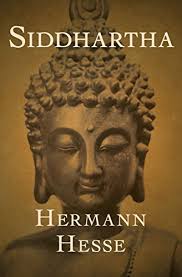Siddhartha Page #12
Siddhartha is a novel by Hermann Hesse that deals with the spiritual journey of self-discovery of a man named Siddhartha during the time of the Gautama Buddha. The book, Hesse's ninth novel, was written in German, in a simple, lyrical style.
"An advice? Why not? Who wouldn't like to give an advice to a poor, ignorant Samana, who is coming from the jackals of the forest?" "Dear Kamala, thus advise me where I should go to, that I'll find these three things most quickly?" "Friend, many would like to know this. You must do what you've learned and ask for money, clothes, and shoes in return. There is no other way for a poor man to obtain money. What might you be able to do?" "I can think. I can wait. I can fast." "Nothing else?" "Nothing. But yes, I can also write poetry. Would you like to give me a kiss for a poem?" "I would like to, if I'll like your poem. What would be its title?" Siddhartha spoke, after he had thought about it for a moment, these verses: Into her shady grove stepped the pretty Kamala, At the grove's entrance stood the brown Samana. Deeply, seeing the lotus's blossom, Bowed that man, and smiling Kamala thanked. More lovely, thought the young man, than offerings for gods, More lovely is offering to pretty Kamala. Kamala loudly clapped her hands, so that the golden bracelets clanged. "Beautiful are your verses, oh brown Samana, and truly, I'm losing nothing when I'm giving you a kiss for them." She beckoned him with her eyes, he tilted his head so that his face touched hers and placed his mouth on that mouth which was like a freshly cracked fig. For a long time, Kamala kissed him, and with a deep astonishment Siddhartha felt how she taught him, how wise she was, how she controlled him, rejected him, lured him, and how after this first one there was to be a long, a well ordered, well tested sequence of kisses, everyone different from the others, he was still to receive. Breathing deeply, he remained standing where he was, and was in this moment astonished like a child about the cornucopia of knowledge and things worth learning, which revealed itself before his eyes. "Very beautiful are your verses," exclaimed Kamala, "if I was rich, I would give you pieces of gold for them. But it will be difficult for you to earn thus much money with verses as you need. For you need a lot of money, if you want to be Kamala's friend." "The way you're able to kiss, Kamala!" stammered Siddhartha. "Yes, this I am able to do, therefore I do not lack clothes, shoes, bracelets, and all beautiful things. But what will become of you? Aren't you able to do anything else but thinking, fasting, making poetry?" "I also know the sacrificial songs," said Siddhartha, "but I do not want to sing them any more. I also know magic spells, but I do not want to speak them any more. I have read the scriptures--" "Stop," Kamala interrupted him. "You're able to read? And write?" "Certainly, I can do this. Many people can do this." "Most people can't. I also can't do it. It is very good that you're able to read and write, very good. You will also still find use for the magic spells." In this moment, a maid came running in and whispered a message into her mistress's ear. "There's a visitor for me," exclaimed Kamala. "Hurry and get yourself away, Siddhartha, nobody may see you in here, remember this! Tomorrow, I'll see you again." But to the maid she gave the order to give the pious Brahman white upper garments. Without fully understanding what was happening to him, Siddhartha found himself being dragged away by the maid, brought into a garden-house avoiding the direct path, being given upper garments as a gift, led into the bushes, and urgently admonished to get himself out of the grove as soon as possible without being seen. Contently, he did as he had been told. Being accustomed to the forest, he managed to get out of the grove and over the hedge without making a sound. Contently, he returned to the city, carrying the rolled up garments under his arm. At the inn, where travellers stay, he positioned himself by the door, without words he asked for food, without a word he accepted a piece of rice-cake. Perhaps as soon as tomorrow, he thought, I will ask no one for food any more. Suddenly, pride flared up in him. He was no Samana any more, it was no longer becoming to him to beg. He gave the rice-cake to a dog and remained without food. "Simple is the life which people lead in this world here," thought Siddhartha. "It presents no difficulties. Everything was difficult, toilsome, and ultimately hopeless, when I was still a Samana. Now, everything is easy, easy like that lessons in kissing, which Kamala is giving me. I need clothes and money, nothing else; this a small, near goals, they won't make a person lose any sleep." He had already discovered Kamala's house in the city long before, there he turned up the following day. "Things are working out well," she called out to him. "They are expecting you at Kamaswami's, he is the richest merchant of the city. If he'll like you, he'll accept you into his service. Be smart, brown Samana. I had others tell him about you. Be polite towards him, he is very powerful. But don't be too modest! I do not want you to become his servant, you shall become his equal, or else I won't be satisfied with you. Kamaswami is starting to get old and lazy. If he'll like you, he'll entrust you with a lot." Siddhartha thanked her and laughed, and when she found out that he had not eaten anything yesterday and today, she sent for bread and fruits and treated him to it. "You've been lucky," she said when they parted, "I'm opening one door after another for you. How come? Do you have a spell?" Siddhartha said: "Yesterday, I told you I knew how to think, to wait, and to fast, but you thought this was of no use. But it is useful for many things, Kamala, you'll see. You'll see that the stupid Samanas are learning and able to do many pretty things in the forest, which the likes of you aren't capable of. The day before yesterday, I was still a shaggy beggar, as soon as yesterday I have kissed Kamala, and soon I'll be a merchant and have money and all those things you insist upon." "Well yes," she admitted. "But where would you be without me? What would you be, if Kamala wasn't helping you?" "Dear Kamala," said Siddhartha and straightened up to his full height, "when I came to you into your grove, I did the first step. It was my resolution to learn love from this most beautiful woman. From that moment on when I had made this resolution, I also knew that I would carry it out. I knew that you would help me, at your first glance at the entrance of the grove I already knew it." "But what if I hadn't been willing?" "You were willing. Look, Kamala: When you throw a rock into the water, it will speed on the fastest course to the bottom of the water. This is how it is when Siddhartha has a goal, a resolution. Siddhartha does nothing, he waits, he thinks, he fasts, but he passes through the things of the world like a rock through water, without doing anything, without stirring; he is drawn, he lets himself fall. His goal attracts him, because he doesn't let anything enter his soul which might oppose the goal. This is what Siddhartha has learned among the Samanas. This is what fools call magic and of which they think it would be effected by means of the daemons. Nothing is effected by daemons, there are no daemons. Everyone can perform magic, everyone can reach his goals, if he is able to think, if he is able to wait, if he is able to fast."
Translation
Translate and read this book in other languages:
Select another language:
- - Select -
- 简体中文 (Chinese - Simplified)
- 繁體中文 (Chinese - Traditional)
- Español (Spanish)
- Esperanto (Esperanto)
- 日本語 (Japanese)
- Português (Portuguese)
- Deutsch (German)
- العربية (Arabic)
- Français (French)
- Русский (Russian)
- ಕನ್ನಡ (Kannada)
- 한국어 (Korean)
- עברית (Hebrew)
- Gaeilge (Irish)
- Українська (Ukrainian)
- اردو (Urdu)
- Magyar (Hungarian)
- मानक हिन्दी (Hindi)
- Indonesia (Indonesian)
- Italiano (Italian)
- தமிழ் (Tamil)
- Türkçe (Turkish)
- తెలుగు (Telugu)
- ภาษาไทย (Thai)
- Tiếng Việt (Vietnamese)
- Čeština (Czech)
- Polski (Polish)
- Bahasa Indonesia (Indonesian)
- Românește (Romanian)
- Nederlands (Dutch)
- Ελληνικά (Greek)
- Latinum (Latin)
- Svenska (Swedish)
- Dansk (Danish)
- Suomi (Finnish)
- فارسی (Persian)
- ייִדיש (Yiddish)
- հայերեն (Armenian)
- Norsk (Norwegian)
- English (English)
Citation
Use the citation below to add this book to your bibliography:
Style:MLAChicagoAPA
"Siddhartha Books." Literature.com. STANDS4 LLC, 2024. Web. 23 Dec. 2024. <https://www.literature.com/book/siddhartha_24>.




Discuss this Siddhartha book with the community:
Report Comment
We're doing our best to make sure our content is useful, accurate and safe.
If by any chance you spot an inappropriate comment while navigating through our website please use this form to let us know, and we'll take care of it shortly.
Attachment
You need to be logged in to favorite.
Log In